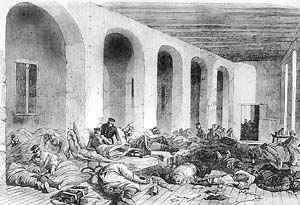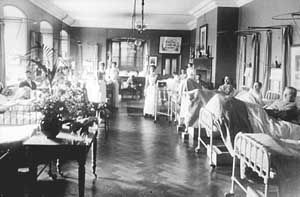How did the
Crimean War improve conditions in hospitals?

|
Crimean War, Russia.
Appalling conditions are depicted
|

|
A typical Nightingale ward (c.1910)
|
the Crimean War was fought by Britain, France and Turkey against
Russia between 1854-56. the British public were scandalised by newspaper
reports about the treatment of wounded soldiers in the Barrack Hospital
in Scutari near Istanbul. With the newly invented telegraph, the Times
war correspondent, William Russell, was able to provide vivid,
up-to-date reports of conditions.
At the hospital soldiers were left lying on bare floors; there were
no supplies of any kind and they had no more than one meal a day, if
that. there were no lavatories or sanitation and no nurses or bandages.
Men were left to die in great pain without any medical attention.
the Secretary of State for War, Sidney Herbert, asked Florence
Nightingale to go to Scutari to superintend the hospital. Before she
arrived, more men were dying of fever and infection than from fighting.
Even so, army doctors, worried about the effect on the soldiers'
discipline, did not welcome her and her 38 nurses, but all the same she
and her team made great improvements very quickly.
Florence Nightingale enforced rules on cleanliness, introduced
special diets, improved the water supply and made sure there was enough
food and gave the men proper nursing care. Two years after her arrival,
the death rate at the hospital was two per cent. It had been 40 per cent
when she arrived.
Another nurse, Mary Seacole, also went to the Crimea and at her own
expense set up a medical store and hostel near Balaclava and also nursed
the wounded on the battlefield, but, in spite of her popularity with
soldiers, was not invited to join Florence Nightingale.
Think about
this:
- How war can often act as a catalyst for change
- How the role of individuals can affect change
- the development of the nursing profession met with opposition and
why this would be.
|